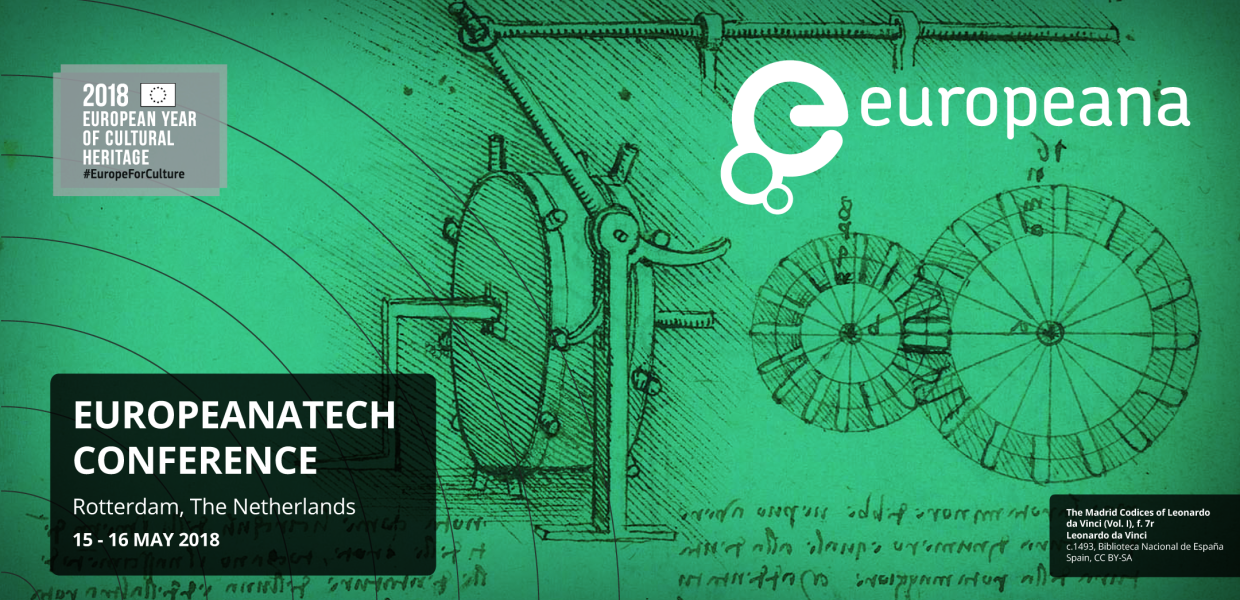EuropeanaTech 2018 - Our keynote speakers - part two
In part two of our introduction to the EuropeanaTech 2018 keynote speakers, we present two more experts that we are thrilled to have joining the 300+ innovators and thought-leaders from around the world attending the event.

- Title:
- The Madrid Codices of Leonardo Da Vinci (Vol. I), f. 7r
- Creator:
- Leonardo Da Vinci
- Date:
- c.1493
- Institution:
- Biblioteca Nacional de España
- Country:
- Spain
- Copyright:
- CC BY-SA
About EuropeanaTech 2018
EuropeanaTech 2018 will place tech firmly at the centre of the European Year of Cultural Heritage and will bring together an international network of technical and R&D specialists from cultural heritage organisations, research institutions and creative industries. Leading specialists, practitioners and researchers from across the world will converge in Rotterdam in May 2018 to share innovative progress and forecast the technical future of digital cultural heritage.
The conference will cover the three - Ds, Data, Discovery and Delivery - and we are delighted with the array of experts we have to lead us through these areas. No less so than our keynote speakers, who have been cherry-picked from different industries ranging from research to heritage, and who are recognised as world-leaders in their fields.
Book your place
Alongside our keynote speakers we have a very exciting line-up of speakers and panel members who are leading the way in tech, and there are even two free events on the day before the conference starts. View the programme and get your ticket now for the bargain price of €185.
Meet our keynote speakers:
Robert Sanderson, Semantic Architect, J. Paul Getty Trust, United States
Robert Sanderson is a world-renowned information scientist and expert in linked open data and the digitisation of cultural heritage. He is the Getty’s first semantic architect and is a passionate advocate for open culture. His conference call will be to 'Shout It Out: LOUD’.
The introduction of the Semantic Web, built on RDF and standards-based, graph-centric technologies, led to a significant shift in the way we think about data. But thinking isn't enough. The introduction of Linked Open Data, with its five stars of excellence, led to a significant shift in the way we use the web to publish data. But just publishing isn't enough either. We are entering the next phase, caused by recognising that the key missing ingredient is usability of the data by consuming applications. We are moving rapidly towards Linked Open Usable Data. If the data is not usable or developer-friendly, then there will not be applications built that use it. If there is no use, there is no value to the resources invested in its creation, publication and improvement.
In his Data strand keynote, on Tuesday 15 May, Robert will discuss some of the critical technology advancements and adopted best practices that have moved us closer to the goal line - from JSON-LD and schema.org, through IIIF and more recently linked.art. The presentation will contrast both processes and products, with an emphasis on adoption of standards to the benefit of the community. By learning from both successes and failures of technologies and communities, we can better enable the sustainable, decentralised delivery and discovery of culturally significant data and content. To be successful in the missions of our organisations, we must take up the banner of usable data and get LOUD.
Robert says: 'I am greatly looking forward to discussing the digital aspects of cultural heritage at the EuropeanaTech conference, as it brings together a diverse spectrum of museum, library, gallery and archival stakeholders and viewpoints on data, discovery and usability. EuropeanaTech makes the most of the network that Europeana has created to highlight the great work in Europe, and provide a practical forum for furthering cultural heritage, which is increasingly integrated and digital.'
Ruben Verborgh, Professor of Semantic Web technology, Ghent University, Belgium
With expertise in decentralisation, hypermedia clients, Web APIs and Linked Data, Ruben Verborgh is currently collaborating with Tim Berners-Lee on re-decentralising the web. Under the title 'One flew over the cuckoo’s nest', he will address the role of aggregation on a decentralised web.
Talk to any librarian, archivist, or museum curator and you will find they have one thing in common: an unconditional love for the metadata they produce. Like parents raising a child and birds hatching an egg, eventually the time comes when our younglings think they're ready to spread their wings and fly into the unknown. Is it our destiny to prepare them for this flight and then disappear, or should we remain a safe haven to which they always can return? The story of decentralisation versus aggregation ultimately revolves around the tension between control and trust, between holding on and letting go. In his keynote, Ruben will explain that, instead of making that choice, we rather need to strive for achieving the best of both worlds. Decentralisation and aggregation go hand in hand—there's a place for both in a loving nest.
Ruben says: ‘EuropeanaTech brings together critical and creative thinkers from all sides of the cultural heritage domain, I am looking forward to reuniting with them all in May.’
Ruben is presenting our Discovery strand keynote on Wednesday 16 May.

